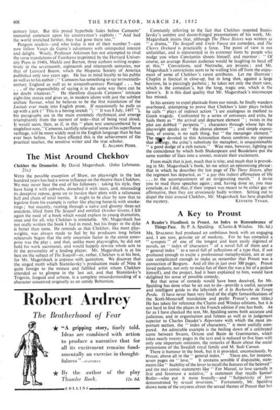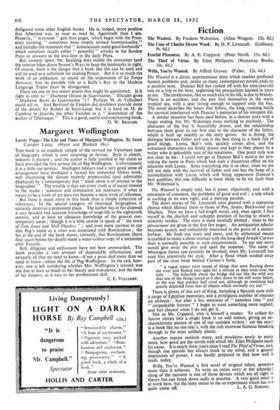A Key to Proust
MR. SPALDING had produced an ambitious book with an engaging and, I am sure, genuine air of modesty. For he has compiled a " synopsis " of one of the longest and least easily digested of novels, an "index of characters" of a novel full of them and a " general index " to a novel full of reflections of a type that, if not profound enough to excite a professional metaphysician, are at any rate complicated enough to make us remember that Proust was a connection of Bergson. And all this in just over 300 pages. Proust loved pedants, not only to make fun of them (he was a bit of a pedant himself), and the project, had it been explained to him, would have delighted his sense of possible comedy.
But that sense of comedy would have been deceived, for Mr. Spalding has done what he set out to do—provide a useful, accurate and intelligent guide to the labyrinth of A la Recherche du Temps Perdu. (I have never been very fond of the slight fantastifications of the Scott-Moncrieff translation and prefer Proust's own titles.) He has taken for reference the Chatto and Windus editions, but it is not hard to find the places in the French edition if one has both. As far as I have checked the text, Mr. Spalding seems both accurate and judicious, and in organisation and fulness as well as in judgement superior to Charles Daudet's Repertoire with which the most im- portant section, the " index of characters," is most usefully com-
pared. An admirable example is the boiling down of a celebrated scene between Swann, Oriane and Basin de Guermantes, which takes nearly twenty pages in the text and is reduced to five lines with only one important omission, the remarks of Basin about the social pretensions of the Swedish royal family and M. Sadi Camot. There is humour in the book, but it is provided, unconsciously, by Proust, above all in the" general index." There are, for instance, seven pages on " love." It contains sensible if disputable, state- ments like" Inability of the lover to recall the features of the beloved" and (to me) comic statements like " For Marcel, to love carnally is first and foremost a sedative," a statement that recalls Samuel Butler—who put it more brutally—and "Subjectivity of love demonstrated by sexual inversion." Fortunately, Mr. Spalding shows none of the coyness about the sexual themes of Proust that has
disfigured some other English books. He is, indeed, more positive that Albertine was, as near as need be, Agostinelli than I am. Properly, " inversion "gets four pages, which begin with the Prou- stian warning, "sometimes most ineptly termed homosexuality," and includes the statement that" homosexuals make good husbands" which somehow recalls either " powerful " articles in the Sunday Press or answers to the love-lorn in the daily Press.
But, comedy apart, Mr. Spalding does enable the newcomer (and the veteran hiker down Swann 's Way) to keep the landmarks in sight. Of course, there is the danger that a book like this can be used and will be used as a substitute for reading Proust. But it is so much the work of an enthusiast, so sound on the importance of Le Temps Retrouve, that its possible role as a Kelly's Key to the Modern Language Tripos must be disregarded.
There are one or two minor points that might be questioned. Is it right to refer to" Duchesse Oriane de Guermantes " (Daudet gives " Duchesse Basin de Guennantes ") ? Perhaps M. de Valhubert could tell us. And Bertrand de Fenelon did doubtless provide some of the details for Robert. de Saint-Loup, but it is hard on M. de Cambrai to describe the other Fenelon as a " descendant of the author of Telemaque." This is a good, useful and entertaining book.
D. W. BROGAN.



































 Previous page
Previous page